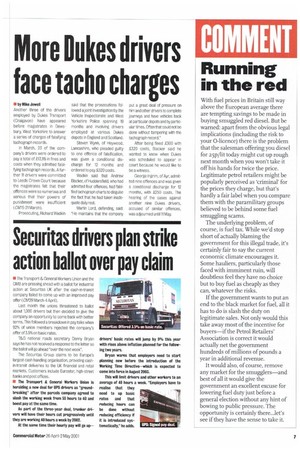Running in the red
Page 9

If you've noticed an error in this article please click here to report it so we can fix it.
With fuel prices in Britain still way above the European average there are tempting savings to be made in buying smuggled red diesel. But be warned: apart from the obvious legal implications (including the risk to your 0-licence) there is the problem that the salesman offering you diesel for 25p/lit today might cut up rough next month when you won't take it off his hands for twice the price. Legitimate petrol retailers might be popularly perceived as 'criminal' for the prices they charge, but that's hardly a fair label when you compare them with the paramilitary groups believed to be behind some fuel smuggling scams.
The underlying problem, of course, is fuel tax. While we'd stop short of actually blaming the government for this illegal trade, it's certainly fair to say the current economic climate encourages it. Some hauliers, particularly those faced with imminent ruin, will doubtless feel they have no choice but to buy fuel as cheaply as they can, whatever the risks.
If the government wants to put art end to the black market for fuel, all it has to do is slash the duty on legitimate sales. Not only would this take away most of the incentive for buyers—if the Petrol Retailers' Association is correct it would actually net the government hundreds of millions of pounds a year in additional revenue.
It would also, of course, remove any market for the smugglers—and best of all it would give the government an excellent excuse for lowering fuel duty just before a general election without any hint of bowing to public pressure. The opportunity is certainly there...let's see if they have the sense to take it.
































































































